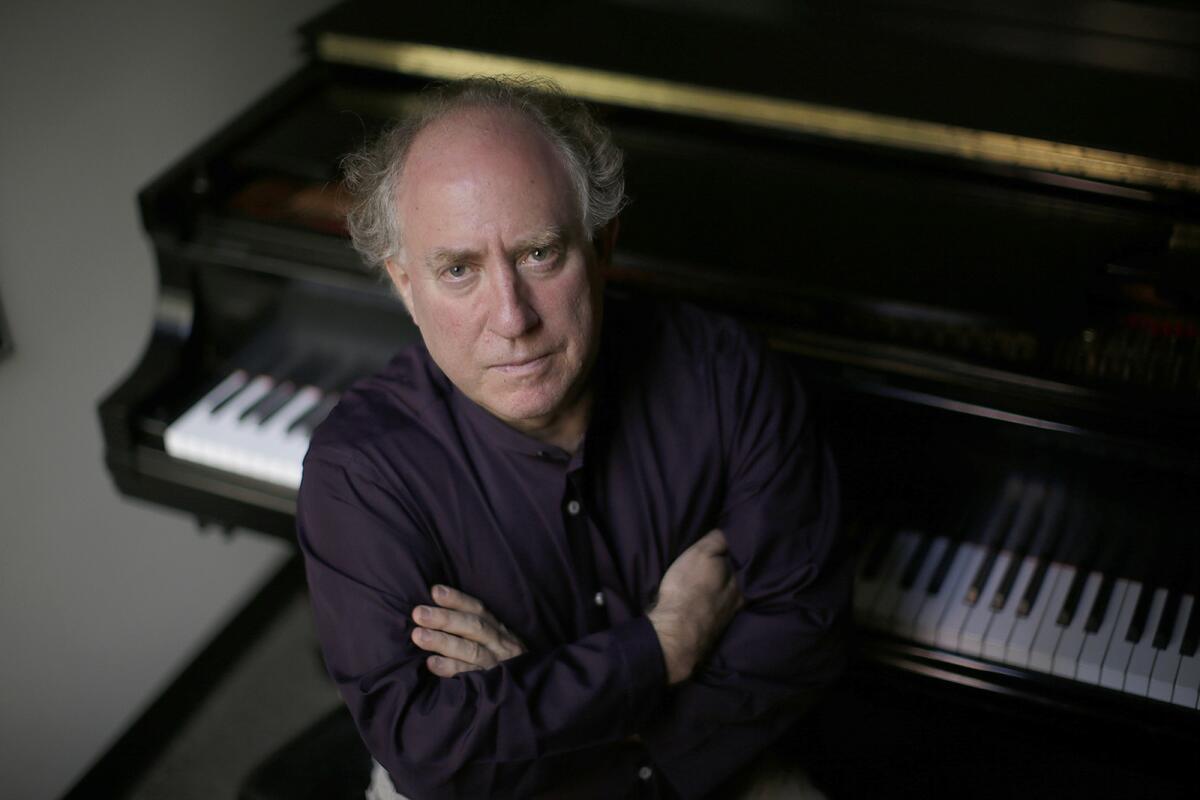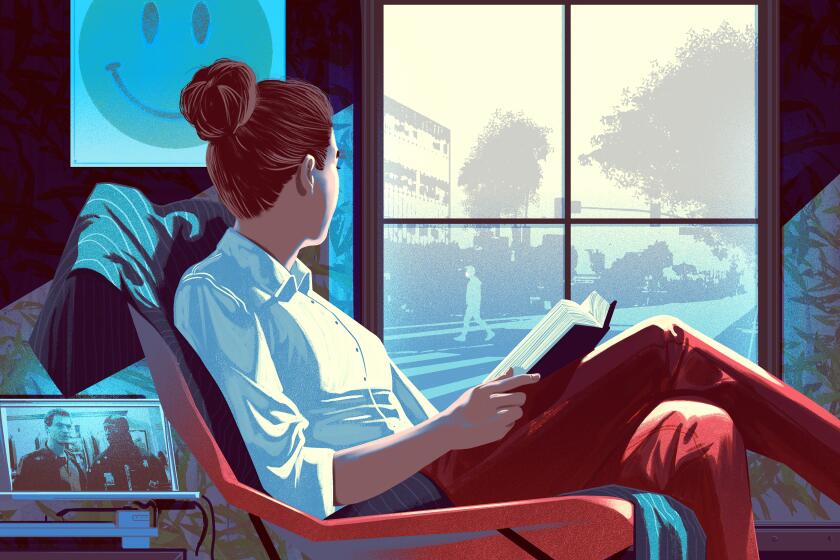Column: Home with Dudamel, Kahane, Mehta: Social distancing can’t stop the sharing of music

- Share via
Over the last few days, I have dropped into the homes of players from Southern California and around the world. I was profoundly moved by Jeffrey Kahane, casually dressed and sitting at the big Fazioli piano in what looked like a heavenly rooftop studio, playing the last movement of Schumann’s Fantasy as though he had the whole world in his hands.
I was stirred to the core by Zubin Mehta, presumably standing in his Brentwood study in front of a fragment of stunningly nude classical statuary, conducting “Nessun Dorma” with three Italian tenors in their coronavirus-ravaged country.
I caught up with Gustavo Dudamel in his study, the first episode of “At Home With Gustavo” on KUSC-FM (91.5). I joined 500 others in a participatory performance of Pauline Oliveros’ “Tuning Meditation.” I watched the isolated violinist Anne-Sophie Mutter, who has tested positive for the COVID-19 virus, wearing a mask as she played the slow movement of Beethoven’s “Harp” quartet with three other string players sheltered in their places.
The Germans have long had a word for it: Hausmusik, which is exactly what the term sounds like. Public concerts are a relatively recent invention, and the first ones in the 17th century were held in private homes. Concert halls came along the next century. But now, with possibly the most sudden cultural shakeup the world has ever known, Hausmusik has once more become the way of life for all musicians.
It is, of course, far too early to predict how or whether the coronavirus will fundamentally change the mind-set of musicians and audiences. Surely, we will someday flock back to public events with a renewed sense of gratitude and appreciation.
In my own Hausmusik experiences recently, Kahane was the standout. He appeared as part of a 24-hour ad-hoc “Music Never Sleeps NYC” marathon, put on by the tireless cellist Jan Vogler.
The latest updates from our reporters in California and around the world
Kahane spoke with a wrenching eloquence that matched our moment, and along with the Schumann, he offered an improvisation on “America the Beautiful” that was part prayer, part expression of rage and grief, part communion and fully celebration of the best of what it means to be an American. This is a message America needs to hear. The short video apparently is not available on demand, but a fine place for it to land would be on the Los Angeles Chamber Orchestra website, of which Kahane is conductor laureate.
Another outstanding moment early on in the marathon was Zlatomir Fung, the 20-year-old cellist from Oregon who won the gold medal at last summer’s International Tchaikovsky Competition and who was supposed to have been featured at the Piatigorsky International Cello Competition at USC last month. His performance of Berio’s “Sequenza XIV” was dynamite.
Both Kahane and Fung managed to have capable-enough technology for polished presentation, but that remains a challenge for many. Cellist Antonio Lysy, playing Bach from his home as part of the webcasts that the Broad Stage in Santa Monica has begun, proved unwatchable. The sound was neither synchronized with the video nor close to acceptable. Mutter’s string quartet effort came across as forced. There is nothing in music more intimate than a string quartet, and learning to adapt to quarantine will take some doing. Her leopard skin rug, though, was a nice touch.
“The World Wide Tuning Meditation,” which was put on by the flutist Claire Chase and International Contemporary Ensemble and which will be repeated through April, was a mixed bag. It’s held over Zoom, and you must sign up in advance because spaces are limited. You sing tones while listening to others and opening your essences into resonant acoustic spaces as part of the practice Oliveros calls deep listening.
Here’s how to keep up with pop culture during self-quarantine due to coronavirus concerns.
It was certainly a pleasure to see so many people from around the world tuning in. There was therapy aplenty in communing by droning. You could see people really getting into it. The new-music community joined in solidarity, and that included composer Tania Leon, conductor Christopher Rountree and Juilliard Dean Ara Guzelimian, who becomes the artist director of the Ojai Music Festival next year. The actual sound of it all, however, was more raucous than radiant.
Then again, Oliveros said, “How we listen creates our life.” Chase, in her introduction, said, “Enjoy technological glitch.” All said, while no well-tuned or otherwise meditation, there was something meaningful here in how to proceed. I’ll be back.
When it comes to Hausmusik, much can be learned from radio, which began as a medium for listening at home before also morphing into automobile music, gym music and whatnot. “At Home With Gustavo,” in which KUSC host Brian Lauritzen talks to Dudamel (each from his own home) about the conductor’s favorite pieces and then plays recordings of them, takes us right back to the olden days of listening to concerts on the radio at home.
The format came across as slightly awkward. Dudamel communicates best in person. Not only would he be more effective if we could see him, but he would, I suspect, interact more easily with Lauritzen if both were on camera. Even so, the conductor offered a handy handful of lively anecdotes that helped to propel a listener into the music.
Dudamel said that in his youth he had asked his mentor, José Antonio Abreu, “Maestro, what can I listen to when I wake up?” Mozart’s “Jupiter” Symphony was the immediate answer. The exhilaration from an archived recording of Dudamel conducting the Los Angeles Philharmonic then gave ample evidence of Dudamel’s contention that this truly is “the key to optimism in the morning,” no matter how down you may feel.
In introducing John Adams’ “Short Ride in a Fast Machine,” Dudamel spoke of its irresistible call to dance, a potent example of how we house-bound need to find ways to move. Charmingly, he then noted that the other day was his wife’s birthday, and he told her would take her out dancing, and he did — from the kitchen to the living room.
Next up, Haustanzen? Also next up might be a major KUSC upgrade to the audio quality of its streaming, the modern medium of Hausmusik.
More to Read
The biggest entertainment stories
Get our big stories about Hollywood, film, television, music, arts, culture and more right in your inbox as soon as they publish.
You may occasionally receive promotional content from the Los Angeles Times.












